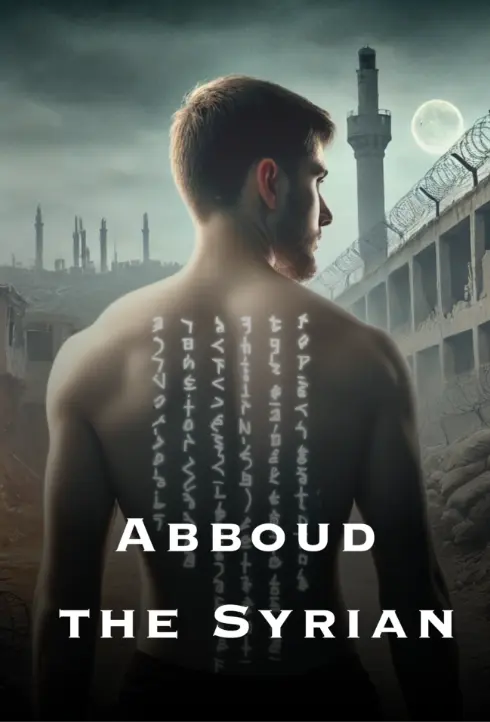Chapter Seventeen: The Trial
On a cold, dark morning, Abboud sat in a dimly lit cell, his hands shackled, not knowing how much time had passed since he was cut off from the outside world. The days dragged on with a painful slowness, and there was no word of Abbas or his family. All he had were memories of that dreadful night in the camp, the moment he had sacrificed himself for his friend. Now, he was here, in an inhumane, cold prison, enduring insults and cruel treatment.
His mind was filled with questions. Why was he here? How had he ended up in this place? Why were refugees subjected to such injustice? He tried to stay strong, but the days were long and hard, each one bringing him closer to breaking.
One day, a guard informed him that his trial date was near. Abboud wasn’t surprised. They had been trying to make an example out of him, the refugee who dared to fight back against a guard. To them, he wasn’t a person; he was just a number in a system that ignored his rights and dignity.
The day of the trial arrived, and Abboud was led into the courtroom, his hands bound, eyes staring at him with a mixture of pity and hatred. The courtroom was filled with people, some just there to witness the spectacle, others journalists covering the plight of refugees.
As Abboud entered the room, he saw the judge sitting behind the bench, surrounded by the court officials. Guards stood beside Abboud, and a court-appointed lawyer stepped forward. Abboud knew the odds were against him, but he had to try.
Judge (sternly): "Abboud, you are accused of assaulting a camp guard, causing serious injury. Do you understand the gravity of the charges against you?"
Abboud (calmly, trying to steady his voice): "Yes, Your Honor, I do."
Judge: "Then, what do you have to say in your defense?"
Abboud knew this was his moment to speak, not just for himself but for all the refugees who were suffering under the same unjust system. He had to be brave, to make his voice heard.
Abboud (his voice filled with pain and suppressed anger): "Your Honor, I didn’t attack the guard out of malice. I was defending my friend, defending our dignity as refugees. We fled from war, from destruction, from death, only to find ourselves here in a place with no mercy. That guard, and others like him, treat us as if we’re nothing. We’re beaten, humiliated, treated like animals. How can this be our fate after all we’ve been through?"
The courtroom was silent, all eyes fixed on Abboud. But the judge remained unmoved.
Judge (coldly): "That does not justify assaulting a guard. The law is clear—assaulting any authority figure is a crime."
Abboud (interrupting, his voice stronger): "But where was the law when we were being beaten and humiliated every day? Where was the law when we begged for food or medical treatment? Where was the law when we were dying slowly in these camps? We are not criminals; we are human beings seeking a dignified life, seeking a chance to live in peace."
Some of the eyes in the courtroom began to shift, a few faces softening as they felt the weight of Abboud’s words. But the judge remained firm.
Judge (seriously): "This is not an acceptable defense in the eyes of the law. Violence cannot be justified by more violence."
The court-appointed lawyer stepped forward, trying to calm the situation, but he seemed unconvinced by his own case. It was just a formality to him.
Lawyer: "Your Honor, my client is suffering from severe psychological trauma due to the war and the conditions he has faced in his homeland, Syria. This must be taken into account."
But Abboud was tired of empty words. He didn’t want to be seen as a victim; he wanted to be seen as a man standing up for his rights and the rights of all refugees.
Abboud (firmly): "I’m not asking for pity. All I ask for is justice. We’ve sacrificed everything to get here—left behind our families, our loved ones, fled from death, only to find ourselves in a place that shows no mercy. Is this what refugees deserve?"
The people in the courtroom listened intently. Some began to feel that Abboud had a real case, but the system was too large for mere words to change.
Judge (after a moment of silence): "Abboud, the court acknowledges the hardships you’ve faced, but it cannot ignore the crime you committed. The law must prevail. Based on the evidence and testimonies presented, the court sentences you to five years in prison."
The sentence hit Abboud like a blow. Five years? How could he survive five years in this hell? How would he keep going without knowing what had happened to his mother or to Layla? What would his future hold?
Abboud (his voice choking): "Five years? All this because I defended myself and my friend?"
The judge did not respond, merely signaling the guards to take Abboud away. As the guards led him out of the courtroom, Abboud looked at the spectators. In some eyes, he saw sympathy, but it wasn’t enough. In that moment, Abboud realized his fight wasn’t over yet. He would continue to fight, not just for himself, but for all the refugees suffering like him.
And as the courtroom doors closed behind him, Abboud felt a new weight added to his burdens. But he swore to himself that he would not give up.
